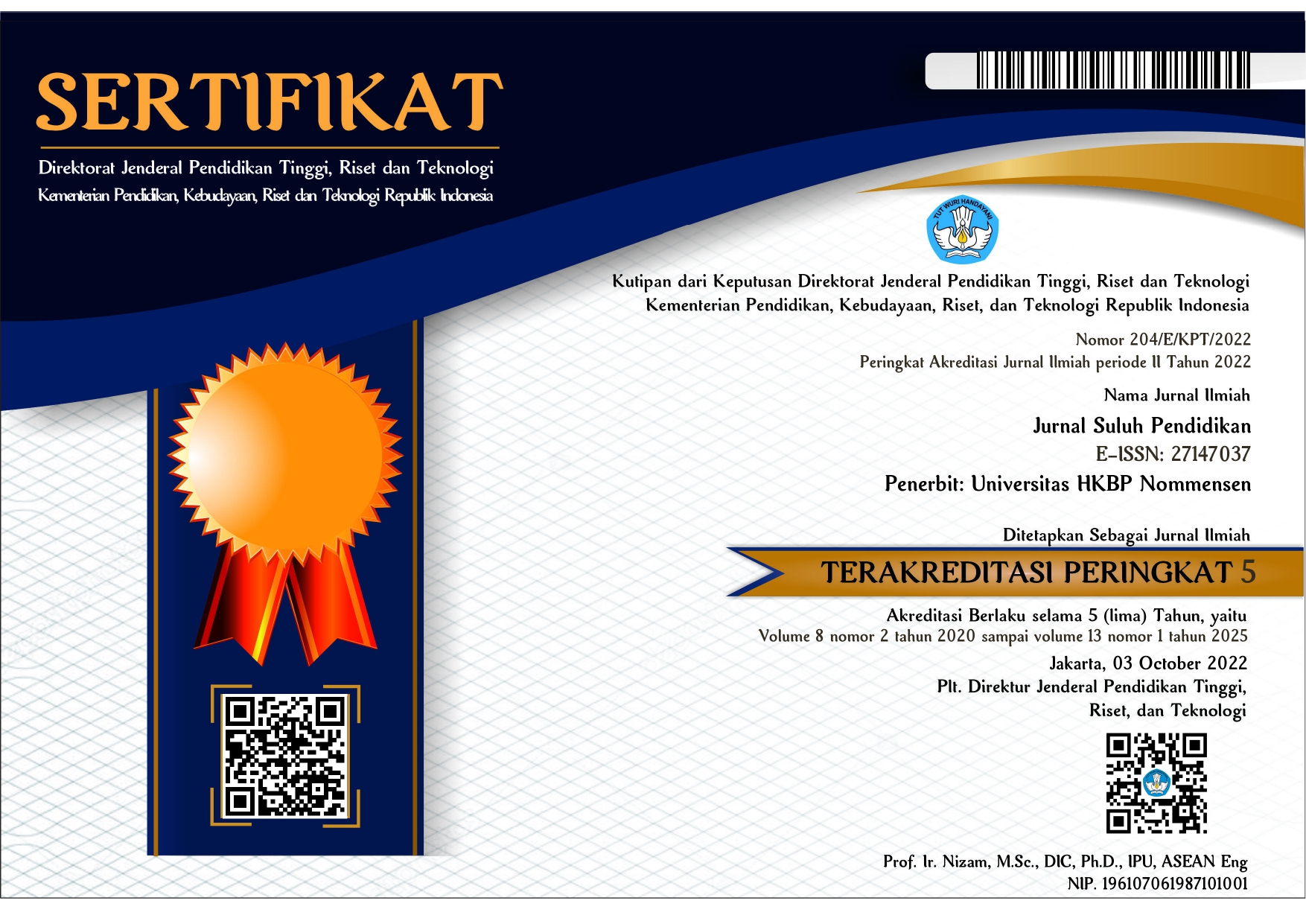Pengaruh Pembelajaran Kooperatif dengan Teknik Think-Pair-Square terhadap Peningkatan Kemampuan Pemahaman Matematis Siswa
Abstract
ABSTRAK
Penelitian ini bertujuan untuk mengetahui apakah peningkatan kemampuan pemahaman dan komunikasi matematis siswa yang mendapat pembelajaran kooperatif dengan teknik Think-Pair-Square (TPS) lebih tinggi daripada siswa yang mendapat pembelajaran konvensional. Penelitian dilakukan dengan menggunakan metode eksperimen dan desain kelompok kontrol non-ekivalen. Populasi dalam penelitian ini adalah seluruh siswa kelas I SMA Swasta HKBP Pematangsiantar. Untuk memperoleh data yang diperlukan, digunakan instrumen berupa tes kemampuan pemahaman matematis, format observasi, dan angket untuk siswa. Analisis data dilakukan secara kuantitatif untuk data hasil pretes, postes, dan nilai gain, dan secara kualitatif untuk data hasil observasi, dan angket untuk siswa. Hasil penelitian menunjukkan bahwa: (a) Peningkatan kemampuan pemahaman matematis siswa yang mendapat pembelajaran kooperatif dengan teknik Think-Pair-Square (TPS) lebih tinggi daripada siswa yang mendapat pembelajaran konvensional; (b) Aktivitas siswa yang mendapat pembelajaran kooperatif dengan teknik Think-Pair-Square (TPS) adalah baik; (c) Siswa menunjukkan sikap yang positif terhadap pembelajaran kooperatif dengan teknik Think-Pair-Square (TPS).
Kata Kunci: Pembelajaran Kooperatif Teknik Think-Pair-Square (TPS), Pemahaman dan Komunikasi Matematis.
ABSTRACT
This research aims to determine whether the increase in mathematical understanding and communication skills of students who receive cooperative learning with Think-Pair-Square (TPS) techniques is higher than students who get conventional learning. The study was conducted using experimental methods and the design of a non-equivalent control group. The population in this study were all first grade students of SMA Swasta HKBP Pematangsiantar. To obtain the required data, instruments used in the form of tests of mathematical understanding ability, observation formats, and questionnaires for students. Data analysis was carried out quantitatively for the results of the pretest, posttest, and gain values, and qualitatively for the observational data, and the questionnaire for students. The results showed that: (a) Increased mathematical understanding ability of students who received cooperative learning with Think-Pair-Square (TPS) techniques was higher than students who received conventional learning; (b) The activities of students who get cooperative learning with Think-Pair-Square (TPS) techniques are good; (c) Students show a positive attitude towards cooperative learning with Think-Pair-Square (TPS) techniques.
Key words : Cooperative Learning Think-Pair-Square (TPS) Techniques, Mathematical Understanding and Communication.
Hak Cipta:
Penulis yang mempublikasikan manuskripnya di jurnal ini menyetujui ketentuan berikut:
- Hak cipta pada setiap artikel adalah milik penulis.
- Penulis mengakui bahwa Jurnal Suluh Pendidikan (JSP) berhak menjadi yang pertama menerbitkan dengan Creative Commons Attribution 4.0 International License (Attribution 4.0 International (CC BY 4.0)).
- Penulis dapat mengirimkan artikel secara terpisah, mengatur distribusi non-eksklusif manuskrip yang telah diterbitkan dalam jurnal ini ke versi lain (misalnya, dikirim ke repositori institusi penulis, publikasi ke dalam buku, dll.), dengan mengakui bahwa manuskrip telah diterbitkan pertama kali di Jurnal Suluh Pendidikan.




